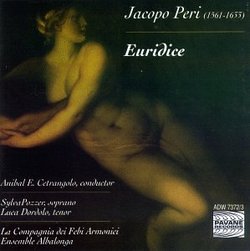| All Artists: Jacopo Peri, Anibal Cetrangolo, Bianca Simone, Marisa Pugina, Sylva Pozzer, Alessandro Carmignani, Luca Dordolo, Mirko Guadagnini Title: Jacopo Peri: Euridice Members Wishing: 1 Total Copies: 0 Label: Pavane Release Date: 9/16/2000 Genre: Classical Styles: Opera & Classical Vocal, Historical Periods, Baroque (c.1600-1750) Number of Discs: 1 SwapaCD Credits: 1 UPCs: 789368605927, 5410939737222 |
Search - Jacopo Peri, Anibal Cetrangolo, Bianca Simone :: Jacopo Peri: Euridice
 | Jacopo Peri, Anibal Cetrangolo, Bianca Simone Jacopo Peri: Euridice Genre: Classical
Jacopo Peri's Euridice was written for the marriage festivities in Florence in 1600 of Marie de' Medici and Henri IV of France, Peri used as his text a poem by Ottavio Rinuccini that tells the familiar tale of Orpheus... more » |
Larger Image |
CD Details
Synopsis
Amazon.com
Jacopo Peri's Euridice was written for the marriage festivities in Florence in 1600 of Marie de' Medici and Henri IV of France, Peri used as his text a poem by Ottavio Rinuccini that tells the familiar tale of Orpheus and his bride. To improve the story's suitability for a marriage celebration, in this version the gods allow the lovers to live happily ever after. The earliest opera for which the music has survived, Euridice displayed a new musically enhanced and heightened form of speech that allowed a solo voice to move the story forward and respond to its dramatic needs. But there are two problems. Typically for its time, Euridice is entirely in the form of declamatory recitatives accompanied by basso continuo, with stylized characters, no true arias, and little sustained melody, and thus it becomes tedious to modern ears. Also, while the singers are excellent, the orchestra is dreary and the production as a whole lacks energy and vitality. The set will be valuable to those interested in the history of opera, less so to others. --Alex Morin

 Track Listings (14) - Disc #1
Track Listings (14) - Disc #1